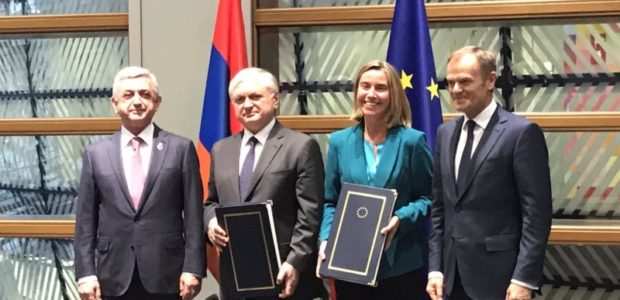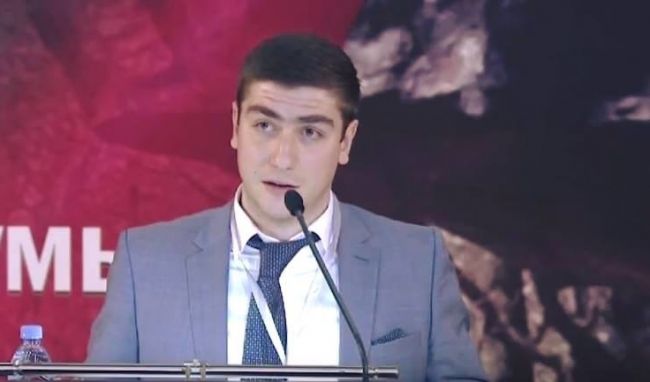Armenia did not sign an agreement with the European Union (EU) four years ago when it first had the chance, but an agreement was signed November 24 in Brussels, on the sidelines of the European Partnership Summit attended by delegations from 28 European Union countries and representatives from Armenia, Georgia, Moldova, Ukraine, Azerbaijan and Belarus.
Despite the fact that Armenia made a U-turn at the time, the EU did not punish Armenia or treat it negatively. On the contrary, it continued friendly relations with Armenia because it was in pursuit of a greater goal; and as we see, this time around, several republics of the former Soviet Union are involved in this new deal, which officially is “not directed against the interests of any particular party” but everyone is aware that it is intended to isolate Russia.
At the signing ceremony, Donald Tusk, the president of the European Council, used the opportunity to criticize Moscow over its actions in Crimea. In addition, Prime Minister Theresa May of Britain did not mince her words in defining the role of the agreement as it pertains to limiting Russia.
The agreement will give Armenia less than what was offered in the previous deal, which was to become part of “deep and comprehensive free trade area.”
It would not be wise to delve into the legal implications of the agreement, without studying the 350-page document, but we can discuss the public fallout. By enlisting countries from the Russian sphere of influence, the EU is doing the US’s bidding as far as antagonizing Russia is concerned.
As a second-rate power, the EU cannot be weaned from the US, no matter what political differences it may have with Washington. President Emanuel Macron of France and Chancellor Angela Merkel have at times been openly critical of the US administration, in an attempt to demonstrate their sovereignty, but they have not gone as far as breaking the relations.
The agreement Armenia came to sign assigns some commitments vis-à-vis the EU; the signatories have to fight domestic corruption, break up monopolies, render the courts independent, hold free elections and so on. One would ask why Armenia could not achieve any of these reforms on its own and has to enter into an association to be forced into implementing them. The reason seems to be that by association, Armenia is committing itself to upholding European values. The second, more valid reason, is that the EU is offering $200 million to Armenia to carry out those reforms by 2020. It looks like the EU has to bribe Armenia to help it make some good decisions.
A respected journalist, Aram Aprahamian, writing in his editorial column in Aravot daily, seems to be skeptical, looking at the faces of those leaders who have been responsible for the current lackluster situation in Armenia.
Armenia came out of Brussels with less than it had bargained for. Thus, the EU had an official statement before the signing ceremony, addressing the Karabakh issue indirectly, by upholding on an equal footing he principles of territorial integrity and the right of self-determination. The second principle was deleted from the final declaration, in deference to Azerbaijan. But to put a positive spin on the situation, Armenia’s top diplomat, Edward Nalbandian, who signed the agreement, announced that “the agreement reaffirms the stated commitments of the European Union to support the efforts and approaches of the co-chairs of the Organization for Security and Cooperation in Europe (OSCE) Minsk Group for the peaceful settlement of the Nagorno Karabakh conflict, based on the norms and principles of international law, in particular the non-use of force or threat of force, equal rights and the principles of self-determination and territorial integrity.”
Just a week ago, the Black Sea Cooperation Council had adopted a similar declaration, omitting the principle of self-determination and no country came to Armenia’s defense and thus the Armenian delegation had to walk out of the conference.
In the second paragraph of the EU agreement, there is a reference to territorial integrity, independence and sovereignty, directed at Russia, to satisfy Georgia, Azerbaijan and Ukraine, once again leaving Armenia in limbo.
On the diplomatic front, the general agreement seems to reign for all parties concerned. According to senior officials in Yerevan, Armenia’s landmark agreement with the EU will not complicate its close political and economic relations with Russia. Speaker of Parliament Ara Babloyan said during a hearing, “Armenia has never followed a path of pitting the interests of its partners, let alone friends, against each other.”
In his turn, Piotr Switalski, the head of the EU delegation in Yerevan, has reinforced Babloyan’s assurances by stating that “the agreement is not directed against any party. It does not contain any provisions which would undermine or influence negatively the interest of other countries that cooperate with Armenia.”
Most worrisome would have been Moscow’s reaction. And again, Armenia would never make the move to get close to the EU without clearing it with Moscow first. On the face of it, the Russian reaction seems to be reassuring in the statement of its Foreign Ministry, which says that Moscow “respects” Yerevan’s desire to forge closer ties with the EU. Russian Ambassador to Yerevan Ivan Volynkin, taking his cue from its Foreign Ministry, has reaffirmed that as a “sovereign country, Armenia is free to form alliances and the CEPA provisions do not run counter to Armenia’s membership in the Russian-led Eurasian Economic Union.”
But these official statements do not jibe well with the ugly attacks that the two state-controlled TV channels in Moscow have unleashed against Armenia. Many talk shows have been aired specially on NTV, where Armenia is portrayed as a woman married to Russia, asking for gifts from the husband while flirting with the European lover.
No Armenian commentator has been invited to those shows to provide any alternative views. Unfortunately, this Armenia-bashing campaign translates into abuses and even murders on the streets of Moscow, where Armenians, as well as other Caucasian immigrants, are singled out on the streets and routinely called derogatory names.
A senior representative of President Vladimir Putin’s United Russia Party visiting Armenia has disowned those scathing attacks, by stating that “such comments do not reflect Moscow’s position on the issue.”
Thus, Armenia, believing it to be its historical mission to bridge East and West, has taken a positive initiative but from all indication, that move is fraught with perils and risks.
Actually, Armenia’s foreign policy has become a multi-vector one. Assuming the chairmanship of the Francophonie organization of French-speaking nations will bring President Macron to Armenia while on the other hand hosting Iran’s Foreign Minister Jawad Zarif led to the signing of significant economic agreements.
And yet, all these activities have to translate into bread for the ordinary citizen’s table, and jobs and hope for the youth to remain in Armenia.
There are many counter currents against Armenia’s development and the government has been taking bold steps to break the isolation and assure all these agreements to yield benefits and now.
https://mirrorspecta...east-west-line/































